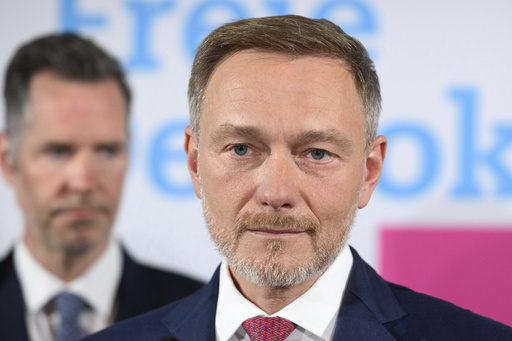
In the recent national elections in Germany, opposition leader Friedrich Merz and his conservative party are poised for a modest victory, while the far-right Alternative for Germany (AfD) has almost doubled its support, showing the strongest performance by such a party since the end of World War II, according to early projections.
Chancellor Olaf Scholz has acknowledged defeat for his center-left Social Democrats, describing the election outcome as “bitter.” Projections from ARD and ZDF public television indicate that the Social Democrats finished in third place, marking their worst performance in post-war history during a national parliamentary election.
Merz is keen to form a coalition government swiftly, although the ease of this task remains uncertain.
This election was held seven months earlier than scheduled due to the collapse of Scholz’s coalition government last November, following a term fraught with disputes. There is evident dissatisfaction among voters, with an overall lack of enthusiasm for candidates this time around.
The campaign primarily focused on concerns about the prolonged stagnation of Germany’s economy and calls for stricter immigration policies — a point pushed hard by Merz in recent weeks. The atmosphere was also charged by growing uncertainty regarding the future of Ukraine and the implications for Europe’s relations with the United States.
As the largest country in the 27-member European Union and a key NATO player, Germany’s decisions will significantly influence the continent’s response to forthcoming challenges, particularly in light of the past administration’s confrontational foreign and trade policies.
Based on initial tallies, projections show Merz’s Union bloc receiving slightly under 29% of the vote, while the AfD secures around 20% — a significant increase from their 2021 results. The Social Democrats have been projected to receive just over 16%, a substantial decrease from their previous showing, which stood at 20.5% in 2017. The Greens, who are the remaining partners in the outgoing government, are estimated to have garnered around 12-13%.
Among the smaller parties, the hard-left Left Party has seen a resurgence, winning up to 9% of the vote, while the pro-business Free Democrats and the Sahra Wagenknecht Alliance are close to the 5% threshold necessary for parliamentary representation.
Whether Merz can secure a majority for a coalition either with Scholz’s Social Democrats or will need another partner remains to be seen, depending on how many parties will hold seats in parliament. He emphasized the need to quickly re-establish a functioning government in Germany, acknowledging the significant challenges that lie ahead. Merz stated the urgency for decisive governance rather than prolonged coalition negotiations.
Vice Chancellor Robert Habeck, representing the Greens, remarked that Merz should consider moderating his approach following a hard-fought election. He noted the general weakening of moderate political forces and suggested that Merz should rise to the responsibilities of leadership.
The Greens have emerged relatively unscathed from their participation in the unpopular government, and the Social Democrats’ general secretary inferred that the defeat was anticipated.
Alice Weidel, the AfD candidate, heralded the party’s new status as the “second strongest force” in parliament, significantly improving from their prior best result of 12.6% in 2017. She indicated the party’s openness to coalition talks with Merz’s group, although Merz has consistently rejected the possibility of collaborating with the AfD, as have other mainstream parties.
Tino Chrupalla, the AfD co-leader, celebrated the party’s success as historic, proclaiming that they have emerged as the political focal point, having distanced themselves from fringe politics.
Scholz expressed concern over the AfD’s performance, insisting that their rise should not be accepted. Josef Schuster, the head of Germany’s prominent Jewish organization, highlighted the worrying trend of nearly a fifth of voters supporting a party associated with extremist ideologies, which preys on public fears while offering superficial solutions.
Over 59 million eligible voters in the nation of 84 million participated in the election to select the 630 members of the Bundestag, Germany’s lower house of parliament, who will convene under the iconic glass dome of the Reichstag building in Berlin.
